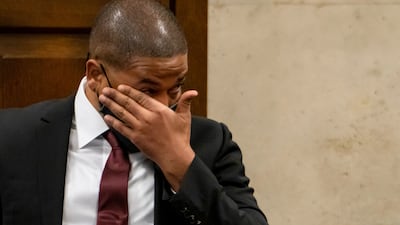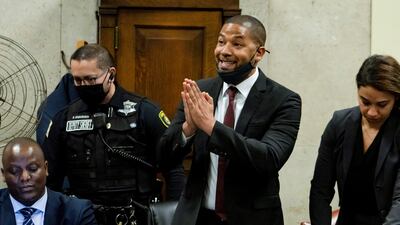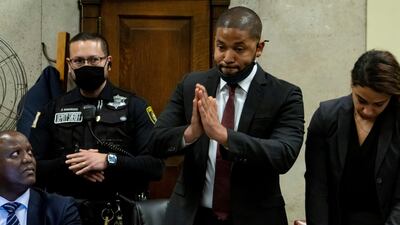"There is nothing that I can do here today that can come close to the damage you've already done to your own life.”
Those were the remarks of judge James Linn, as he sentenced actor Jussie Smollett to 150 days in prison at a hearing in Chicago on Thursday.
“You've turned your life upside down by your conduct and shenanigans," Linn continued.
"You're just a charlatan pretending to be a victim of a hate crime, and that's shameful."
So how, exactly, did a promising and talented actor go from a starring role in the television show Empire to serving jail time?
It’s a long and complicated story.
The rise of Jussie Smollett
Smollett’s acting career started young. As a child, he appeared in films such as The Mighty Ducks and Rob Reiner's North. But it was a starring role in Fox musical drama Empire, alongside Terrence Howard and Taraji P Henson, that truly elevated Smollett’s status.
Playing Jamal Lyon, the son of music mogul Lucious Lyon, Smollett was widely praised for his portrayal of a gay black man and the issues his character faced.
Off the back of his performance in Empire, Smollett signed a recording contract with Columbia Records in 2015, and confirmed plans to release an album at some point in the future. Some of the songs performed on the show, including I Wanna Love You and You're So Beautiful, both co-written by Smollett, were released in 2015 as part of Empire’s original soundtrack from season one.
Away from Empire, Smollett directed B-Boy Blues, a film based on the 1994 novel by James Earl Hardy. The movie was released in November 2021.
The events of 2019
On January 22, 2019, about a week before he was attacked, Smollett, 39, reported to the police that he received an envelope addressed to him, with the word "MAGA" (aka, Trump's "Make America Great Again" slogan) written in red ink on the return address.
Inside was a threat in cut out letters: "You will die black ****". There was white powder in the envelope, which was found later to be Tylenol.
A week after receiving the letter, on January 29, Smollett reported to the police that he was attacked at 2am while at the fast-food store Subway in Chicago, near his apartment. He says the two men yelled homophobic and racist slurs at him, shouting "This is MAGA country", while also wrapping a noose around his neck.
Many people tweeted in support of Smollett after the incident, including US Vice President Kamala Harris, the Democratic presidential candidate at the time, and politician Cory Booker.
On January 30, Chicago police released a grainy image of two suspects, as Smollett released his first statement to the media.
"My body is strong but my soul is stronger. More importantly, I want to say thank you. The outpouring of love and support from my village has meant more than I will ever be able to truly put into words ... These types of cowardly attacks are happening to my sisters, brothers and non-gender conforming siblings daily,” he said. “I am not and should not be looked upon as an isolated incident ... Soon I will address all details of this horrific incident, but I need a moment to process."
Smollett spent the next week appearing on talk shows and also addressed the incident ahead of a concert in West Hollywood.
“The most important thing I have to say is thank you so much and that I'm OK. I'm not fully healed yet, but I'm going to. And I'm gonna stand strong with y'all … l will always stand for love. I will never stand for anything other than that. Regardless of what anyone else says, I will only stand for love. And I hope that you all will stand with me. So now … let's do it,” he said. "There has been a lot of stuff said about me that's absolutely not true ... I'm sure my lawyer's sitting up there like 'No, Jussie, no! No! Shut ... up and sing.'
"Above all, I fought the **** back."
On February 12, Chicago police said that Smollett turned over some of the phone records they requested, but not all of them.
The following day, police arrested two suspects — Nigerian brothers Olabinjo and Abimbola Osundairo — who were picked up at Chicago's O'Hare International Airport. The police didn't initially release their names, but did confirm that one of the brothers had worked on Empire.
The brothers were later released without charge, and information was leaked to the media that law enforcement was now investigating whether Smollett paid the brothers to carry out the attack.
Smollett’s yet-to-be-filmed scenes were cut from Empire, and sources told CBS Chicago that the Osundairo brothers told police that Smollett sent himself the racist letter, and staged the attack when the letter didn't create the reaction he had expected.
On February 20, Smollett was charged with disorderly conduct for allegedly filing a false police report about the attack.
Following the actor’s arrest, Chicago police superintendent Eddie Johnson said: “This publicity stunt was a scar that Chicago didn't earn and certainly didn't deserve.
"Smollett took advantage of the pain and anger of racism to promote his career. This stunt was orchestrated by Smollett because he was dissatisfied with this salary. He concocted a story about being attacked. We gave him the benefit of the doubt."
Smollett was suspended from Empire and entered a not guilty plea, but in March 2019, prosecutors dropped all charges against Smollett after he agreed to do volunteer service and let the city keep his $10,000 bail. Authorities gave no detailed explanation as to why they abandoned the case.
But then, in 2020 …
In February 2020, after a special prosecutor looked into the case, a new six-count indictment was filed.
The actor was charged under Illinois’s disorderly conduct statute, which encompasses a wide range of offences, from making prank 911 calls to placing harassing calls as a debt collector.
He faced six counts of disorderly conduct under a subsection of the law that prohibits false reports to police. Some states don’t categorise false police reports as disorderly conduct.
The charges were listed as class 4 felonies, which are among the least serious felonies in Illinois. But convictions can still carry potential prison time of up to three years.
The case took 18 months to come to trial because of delays caused by the pandemic, but when it was eventually heard in December 2021, Smollett was found guilty of five of the six counts.
Sentencing
Despite many people claiming that jail time would be unlikely for the star, on Thursday, he was sentenced to 30 months’ probation, with the first 150 days to be spent behind bars, and ordered to pay $120,000 restitution for lying to police.
Following the sentence being announced, Smollett left the courtroom with his fist in the air, and exclaimed: "I am innocent, and I am not suicidal. And if anything happens to me when I go in there, I did not do it to myself. And you must all know that.
"If I did this, then it means that I stuck my fist in the fears of black Americans in this country for over 400 years and the fears of the LGBT community," he said. "But I did not do this."



































